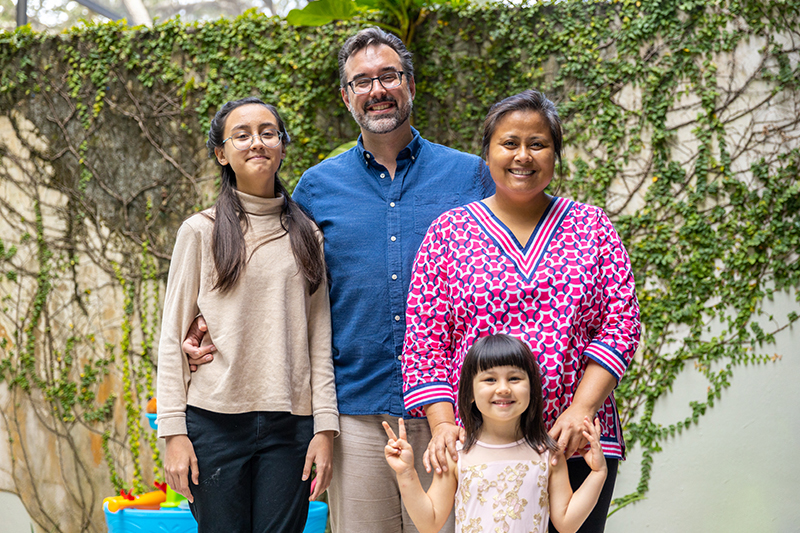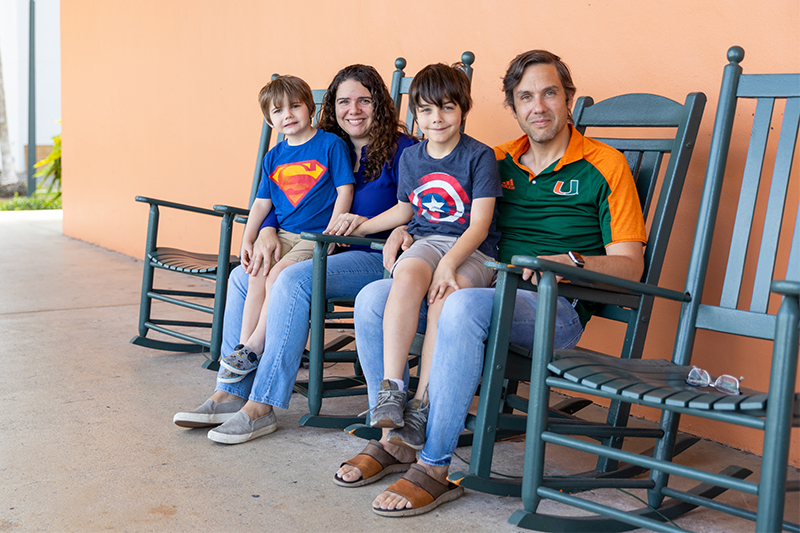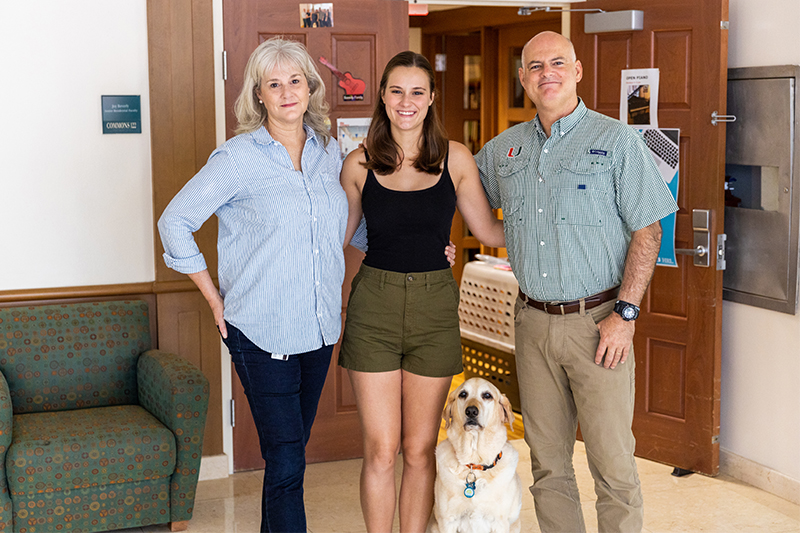Part of what makes campus life unique at the University are the residential faculty members who live in the residential colleges and serve as resources for students. Among their responsibilities, residential faculty members hold office hours in the buildings, host events for the University community in their apartments, and work with resident assistants and students in the First Year Fellows program to provide residents with programming that focuses on current events, social issues, and the faculty members' research interests.
Together with Housing and Residential Life live-in staff, the Coral Gables campus is home to nine residential faculty members. As the semester wrapped up, Life@TheU caught up with a few and asked them to share their experience living on campus during the COVID-19 pandemic this past spring.

Justin Ritzinger—“We abruptly lost our village.”
“Surreal. It feels like you’re having the same day over and over again,” said Justin Ritzinger, professor of Asian religions in the religious studies department. Ritzinger and his family have lived in Mahoney Residential College since August 2019, and they consider the Coral Gables campus to be their little village community. Growing up in a small town, tight-knit community in Wisconsin, campus life resonated with Ritzinger and his wife, Amei, who grew up in a village in Taiwan. “We abruptly lost our village,” he remarked.
Like many, the Ritzingers have found ways to keep a routine for their two daughters, who are 12 and 3. This includes regular walks on campus while keeping a safe distance from others. Currently on sabbatical, Ritzinger makes an effort to continue his research—an ethnographic study of a small, blue-collar, lay buddhist community in Taiwan—between demands for goldfish crackers and help with math problems. He balances home and child-rearing responsibilities with his wife, who virtually teaches Chinese lessons. His new normal involves regular exercise and getting a full night's sleep—as a way to stay healthy—and finding new forms of togetherness online through regular virtual hangouts with family, which he hopes to continue.

Leslie Knecht—“The students keep me going.”
For Leslie Knecht, a senior lecturer in the department of chemistry—who teaches large classes of more than 350 students, often with several sections taught by different instructors—constant communication with teaching assistants and undergraduate peer facilitators has been the most important component for virtual learning. “I have more meetings now virtually than I did in person,” said Knecht, who has lived in Stanford Residential College with her husband, Marc, a chemistry professor in the College of Arts and Sciences, and their two young sons since August 2018. Without the students on campus, she works diligently to make time for one-on-one virtual interactions, whether through individual meetings or by hopping on a group session a few minutes early to chat with her students about how they are doing. “I am constantly listening to their feedback to ensure I am giving them their best chance at success while maintaining the academic integrity and rigor needed for the students to continue in the chemistry sequence successfully,” she said.
When she’s not teaching general and organic chemistry courses online, she is tending to her family, which includes picking up dinner at the dining hall, making sure her 7-year-old finishes his homework, and playing board games or cards. “Students send emails to ask questions, and that excites me because I know that means they are engaging with the material,” she said. “The students keep me going,’’ she added. “They still want to learn, they still show up, and they still participate.”

Joy Beverly—“I've learned to stay in the moment.”
A senior residential faculty member at the Hecht Residential College, Joy Beverly, a mathematics lecturer, has spent the past few months with her husband, Jerry, who serves as the multiarea director for the Fellowship of Christian Athletes; their dog, Colin, a UHealth therapy dog; and their youngest daughter, Gabriela, a spring 2020 graduate from the School of Nursing and Health Studies. “My [quarantine] experience has been one of teaching math while overhearing nursing lectures,” said Beverly. “My respect for the nursing faculty has grown as I have listened to their kind, compassionate, and science-grounded approach to their field.” The eldest daughter, Alexandra—who was married on March 14 just as the shutdowns began—has been working as an intensive care unit nurse at Jackson Memorial Hospital caring for COVID-19 patients while pursuing a degree as a nurse practitioner at UM. The middle daughter, Samantha, is a teacher at Carver Elementary.
Beverly cites monitoring the academic progress and overall well-being of her students while taking care of family needs among her challenges. According to the math lecturer, transitioning to distance learning while synchronously teaching, developing new techniques, building emerging policies, and responding to student needs have made it necessary to work very long days. While it has been exhausting, she has “learned to stay in the moment and be grateful for this minute in time,” she explained. Beverly looks forward to welcoming students back and hopes they will return with all their creative energy, when it is deemed safe to do so. “It's very weird to live in these usually vibrant buildings with no student presence,” she remarked. “I almost feel like the empty spaces are mournful, waiting for the students to return.”
